“Agritech Company Revolutionizing Local Production of Vegetables in Malaysia”
A fast growing agritech start-up in Malaysia is growing fresh produce in high-tech repurposed shipping containers to deliver pesticide-free vegetables to customers with reduced carbon footprint. BoomGrow’s vertical farming patent-pending technology opens the door to the farming of the future, saving space, water, and transportation.
Dr. Jay Desan, one of the BoomGrow co-founders is a researcher. She wrote her Ph.D. in standards of corporate responsibility at Queen Mary, University of London, and went on to advise multinational fortune 500 companies on sustainability policies and environmental social governance for almost two decades.
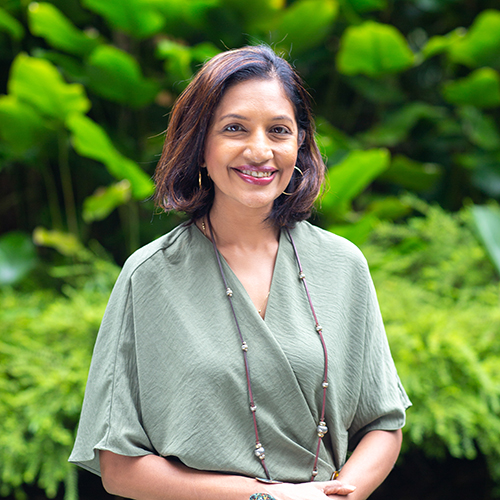
Her interest in sustainability started at university, in particular after she wrote a paper on women and the environment. “That was the trigger point because it dawned on me that environmental degradation is worst on the poorest of the poor.” “It is the underprivileged and women who suffer most,” she said. “It led to a lot of thinking about how we need to reimagine the world.”
Jay, who is former Executive Director of the Malaysian Centre of Regulatory Studies, University Malaya feels she is “both a researcher and an entrepreneur.” “At heart, I am a researcher, I am an accidental entrepreneur, I never planned to be an entrepreneur,” Jay said. “I was always so sure that I would have an academic career, and I would teach at the university.” “That’s all I wanted to do, but I guess life makes its own plans.”
When she came back to Malaysia, the mother of two found it was a challenge to find affordable, pesticide-free produce to feed her family. “It baffled me. I was spending a fortune on clean produce,” she said.
From Rooftop Agriculture to Indoor Farming
That is when Jay with two long-time friends Murali Krishnamurthy, with a background in financial services , and Shan Palani, a designer and architect, who shared her passion for food security and safety, started working on the idea of pesticide-free proximity farming.
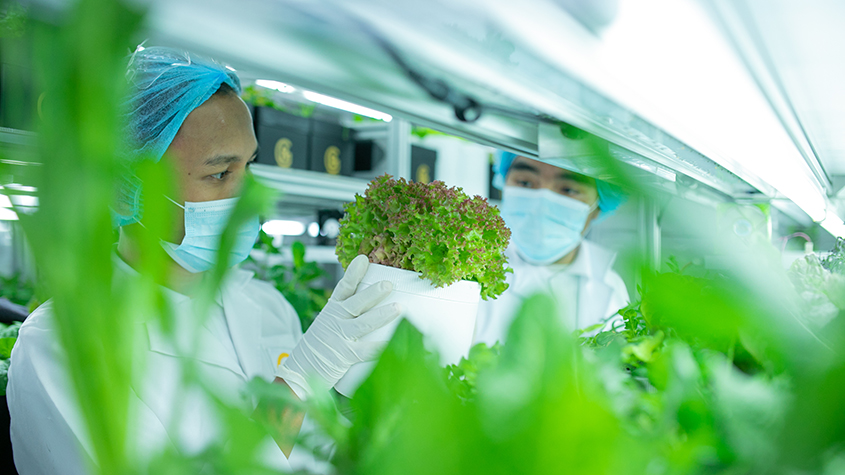
However, the road to BoomGrow was not always easy, she said, in part because “there is no global playbook to do indoor vertical farming.” “It was an adventure and I never knew it would take so long and would be so hard.”
“We had this vision of the need to change the way people live.” The company, launched in 2013, started with a rooftop farming project. “Our office was close to a small neighborhood supermarket and they offered us space on the rooftop,” she recalls. “We started our cultivation there, soon to realize how naïve we had been.” In the tropics, there are storms, and it is too hot for most produce. “The midday sun killed everything,” she said, laughing at the memory.
“What got us through, in the end, was our resilience and our agility. When it did not work, we would try something else.” “We have gone a long way since the rooftop experience.”
The three co-founders explored the idea of indoor farming and after they finished their first prototype of a high-tech repurposed shipping container, were awarded a government grant, which helped the company get off the ground.
Machine Farms, a Hydroponic Vertical Farming System
“Pesticide-Free Produce without the Carbon Mile”
BoomGrow had a research-driven approach and developed a system, called “Machine Farms”, which are repurposed shipping containers.
BoomGrow produces pesticide-free produce grown in a controlled hydroponic environment – the roots of the plants are not grown in soil but in a water-based nutrient-enriched solution – monitoring inputs, light, water, and humidity to optimize growing conditions and outputs. The patent-pending BoomGrow vertical indoor farming system uses about 95 percent less water than traditional agriculture and 95 percent less land.
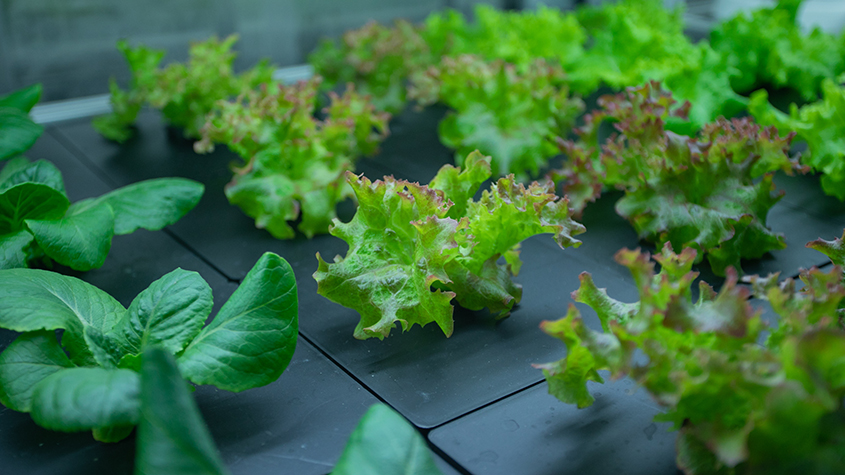
Installed in 40ft shipping containers, the BoomGrow farms are mobile, customizable, and have a modular racking system. The company grows leafy greens, such as kale, Swiss chards, and rocket salad. In 2022, BoomGrow introduced microgreens and is undertaking research and development on tubers, such as carrots for future production.
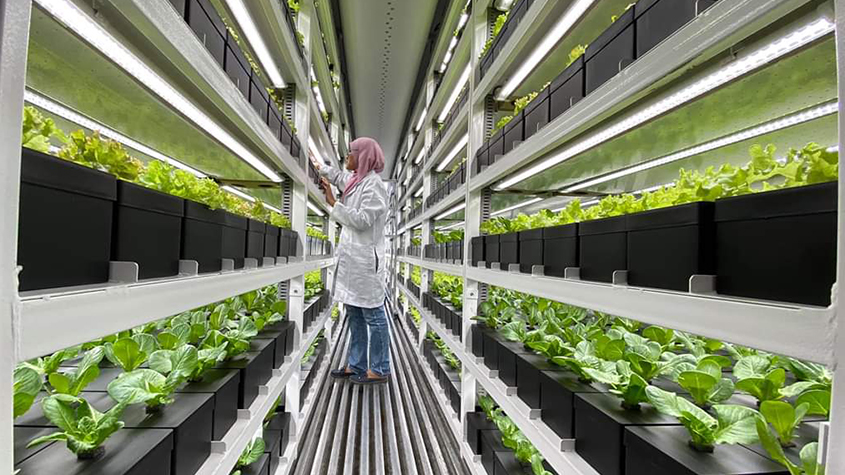
People in Kuala Lumpur, Klang Valley, and Langkawi can get fresh kale, grown in the city, year-round, without the carbon mile, “which never happened before because we had to import all this products from Europe, Australia, or Japan,” she explained.
Precision Farming System Backed by AI
The proprietary BoomGrow agriculture technology was developed by BoomGrow team of R&D specialists, agronomists, and tech engineers. Indoor farming is quite complex, Jay explained. The system includes hardware and software to support all the information flowing from the control sensors, and LED lights. “The technology we developed is the fusion of hardware, software, and agronomy science, and allows for very little human intervention.”
“Constantly collecting data from the farms’ multiple sensors is the only way to get better at what we do,” she said.
BoomGrow has a modular approach and can link several shipping containers, or install single modules in very urban cities. Containers can also be set up in buildings.
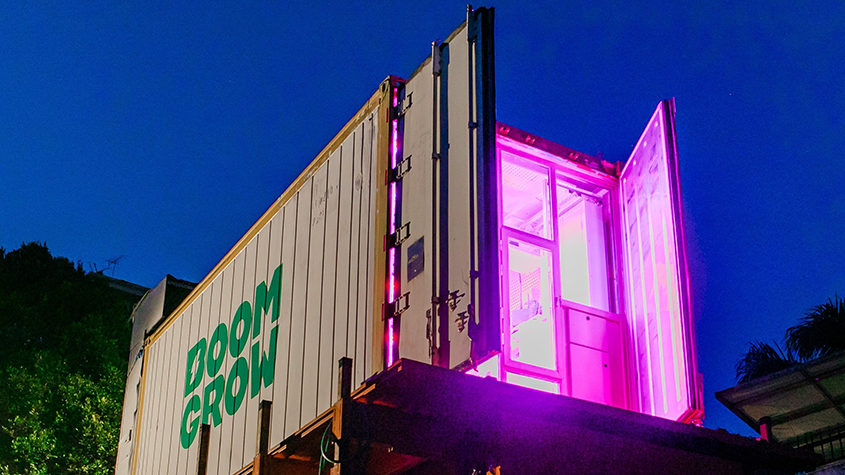
Now staffed with 40 people, BoomGrow sells its farming systems to third parties and provides the servicing, and directly operates some farms. The company relies on a B2B system and delivers to hotels and restaurants, and a B2C model through its e-commerce platform.
4.0 Agriculture: the Future of Farming powered by BoomGrow
BoomGrow transforms farming and provides future-proof and future-ready farming. “When we can grow food next to where consumers live and shop, that will transform how we live,” according to Jay. BoomGrow complements traditional farming, which will also improve its practices following the growing demand for pesticide-free products, she said. Bad farming practices affect our biodiversity, water, and health. Food production needs to be thought of as a whole ecosystem, she added.
Intellectual Property has been fundamental for BoomGrow. “We got the government grant on the back of that patent,” she explained. The patent drove interest in the company, and continues to enable BoomGrow to drive innovation. “That patent is at the heart of what we do,” she said. BoomGrow is also in the process of protecting its brand name.
The Covid-19 put a dampener on the BoomGrow expansion, but “now is the time of scaling production and expanding” said Jay, as the company is seeking to expand throughout Malaysia and South-East Asia.
Source: WIPO

 Client Focus
Client Focus